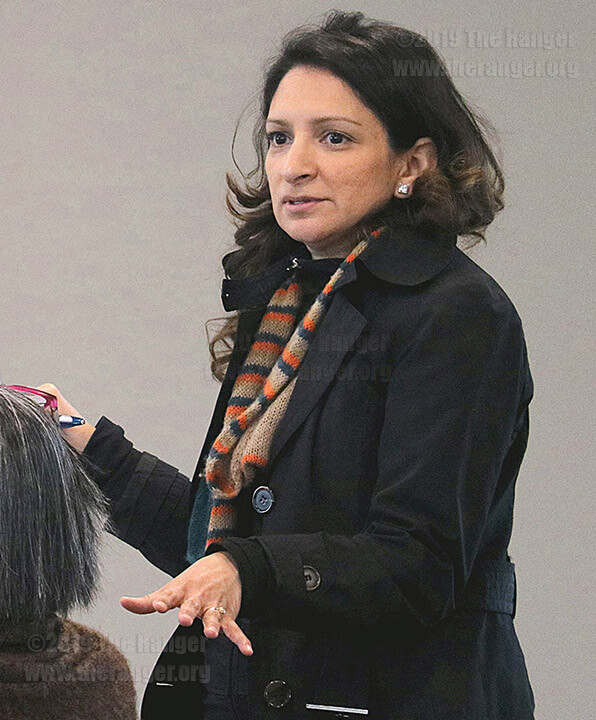
English Professor Patricia Portales talks tenure reinstatement at a Faculty Senate meeting Feb. 8 in Room 204 of the Victory Center. Tenure is the status of indefinite employment protecting professors from termination because of speech and research. It was discontinued in 2011 under Chancellor Bruce Leslie. Amaru Ruiz
Senators suggest productive grade rates should vary.
By Rogelio Escamilla
rescamilla69@student.alamo.edu
A tenure reinstatement proposal will be ready for Faculty Senate President Lenny Irvin by the next meeting March 8, English Professor Patricia Portales, the Faculty Senate research sub-committee chair, said.
Faculty Senate met Feb. 8 to provide updates on morale, the 70 percent productive grade rate and tenure reinstatement.
Tenure for new hires was removed in 2011 under former Chancellor Bruce Leslie.
Any faculty who had tenure or were in the seven-year process of earning tenure were not impacted by the removal.
In a faculty survey last semester, 84.2 percent of the 153 respondents agreed with the statement “I support the reinstatement of tenure.” One hundred and four of them selected “strongly agree.”
Under the faculty morale section, 75 percent agreed with the statement “I make a difference at SAC,” while 38 percent agreed with the statement “my contributions are appreciated at SAC.”
Portales said faculty were shocked when tenure was removed from Alamo Colleges’ policy. She said new faculty often look for schools offering tenure when looking for a job.
“The majority (of faculty) would like to reinstate tenure,” she said. “And we think it’ll attract and retain new faculty. We have a lot of faculty right now who are just on contract, and they’re very nervous about their job security.”
A tenured position, according to the American Association of University Professors, is an “indefinite appointment that can be terminated only for cause or under extraordinary circumstances.”
This prevents a professor from losing a position because of speech, research or publications and “protects academic freedom,” according to AAUP’s website www.aaup.org/issues/tenure.
“It entitles us to freedom in the classroom,” Portales said. “At an institution of higher education, we work on new research, whether or not we do the research here, that’s being done in our fields everywhere. We want to be on the cutting edge of our fields, and if we’re teaching some new aspect, we have to have that protection.”
Jonathan Lee, interim chair of the Mexican-American studies, early childhood studies, sociology, social work and history department, said he does not think tenure should have been taken away and wants his colleagues to have the same opportunity he had.
“We need to look at who does not have the ability to apply for tenure versus those who had the ability and judge if we think that is equitable,” Lee said. “In my department, of the nine people not on the tenure track, eight are women, and about half of those are women of color. The four who have tenure are men.”
As for meeting a PGR of 70 percent, Lee — and most senators in the meeting — agreed the goal does not account for students who struggle more in certain courses than others.
“Perhaps we need to be thinking about what’s a reasonable expectation,” Lee said. “There are a lot of things beyond an instructor’s control.”
A possible solution senate members proposed is allowing departments to have varying PGRs.





1 Comment
As an instructor who has tenure, I feel that it is very important to have these discussions for those “excellent instructors, assistant, associate and regular professors.” So many of them are extremely talented and they deserved it.
Robert De Luna
Government Instructor
St. Philip’s College
1801 Martin Luther King Drive
San Antonio, Texas 78201
210-486-2896 (o)
SLC 219T